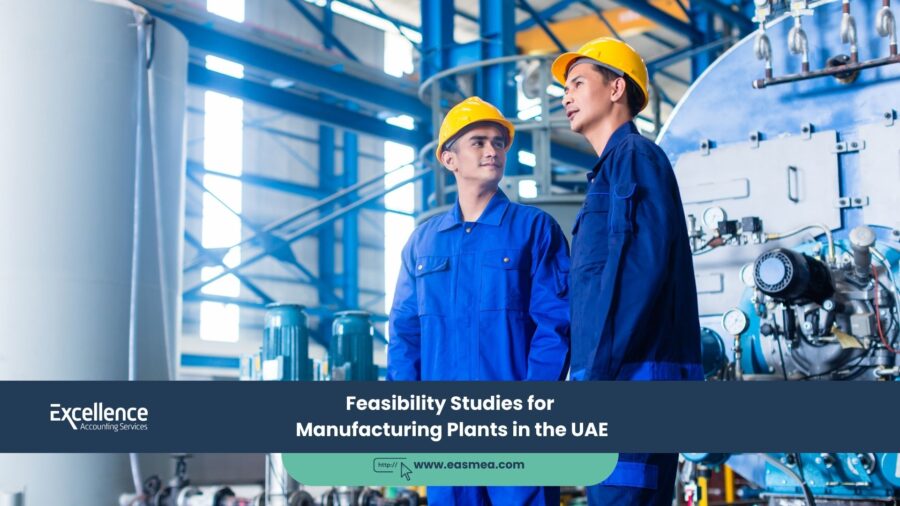A Guide to Feasibility Studies for Manufacturing Plants in the UAE
The UAE has firmly established itself as a leading industrial and manufacturing hub in the Middle East. Through strategic initiatives like “Operation 300bn,” world-class infrastructure in industrial zones like KIZAD and Jafza, and a favorable business environment, the nation presents a compelling case for setting up a manufacturing plant. However, a successful industrial venture is built on much more than a great location; it requires a foundation of rigorous, data-driven planning.
- A Guide to Feasibility Studies for Manufacturing Plants in the UAE
- Why a Feasibility Study is Crucial for Manufacturing
- The Core Components of a Manufacturing Feasibility Study
- Your Blueprint for Industrial Success with Excellence Accounting Services (EAS)
- Frequently Asked Questions (FAQs)
- Planning a Manufacturing Venture? Build it Right from the Start.
Before a single brick is laid or a machine is ordered, the most critical step is to conduct a comprehensive **feasibility study**. This is an in-depth, multi-faceted investigation designed to determine the viability of the proposed manufacturing plant from every conceivable angle. It is the process that separates a profitable industrial powerhouse from a costly white elephant. A feasibility study for a manufacturing plant is a complex undertaking, requiring a deep analysis of market dynamics, technical specifications, logistical challenges, and the intricate regulatory landscape of the UAE.
This guide will walk you through the essential components of a feasibility study for a manufacturing plant in the UAE. We will explore the key questions you need to answer and the critical factors you must analyze to make an informed investment decision.
Key Takeaways
- A Blueprint for Success: A feasibility study is a critical blueprint that assesses the viability of a manufacturing project before significant capital is invested.
- Location is Key: The choice between a Mainland or Free Zone location has profound implications for market access, ownership, and operational costs.
- Technical Viability is Complex: This goes beyond machinery to include raw material sourcing, supply chain logistics, technology selection, and labor availability.
- Financials are More Than CAPEX: A robust financial feasibility study must meticulously project both capital expenditure (CAPEX) and long-term operational expenditure (OPEX) to determine true profitability.
- Regulatory Maze: Navigating UAE environmental regulations, industrial licensing, and import/export laws is a critical component of the study. A professional feasibility study is essential for this.
Why a Feasibility Study is Crucial for Manufacturing
Manufacturing projects are capital-intensive by nature. They involve significant upfront investment in land, buildings, and machinery. Unlike a lean tech startup, you cannot easily “pivot” a factory. A feasibility study is the primary risk mitigation tool that protects this large-scale investment.
It provides a clear-eyed assessment that:
- Validates the Business Case: It confirms that there is a profitable market for the product you intend to manufacture.
- Secures Financing: Banks and investors will not fund a manufacturing project without a detailed and credible feasibility study.
- Optimizes Planning: It helps in making critical decisions about location, technology, and scale before you are locked in.
- Provides a Roadmap: The study serves as a foundational document for the detailed business plan and project execution strategy.
In manufacturing, you measure twice and cut once. The feasibility study is how you measure.
The Core Components of a Manufacturing Feasibility Study
A comprehensive study for a manufacturing plant is typically broken down into four key areas of investigation.
1. Market and Commercial Feasibility
This section determines if there is a viable market for your products.
- Demand Analysis: In-depth research into the size of the local (UAE), regional (GCC), and international markets for your product.
- Competitive Landscape: Identifying key competitors, their market share, pricing strategies, and strengths/weaknesses.
- Pricing and Revenue Forecasts: Developing a realistic pricing strategy and projecting sales volumes and revenues based on market data.
- Offtake Agreements: For many industrial projects, securing preliminary agreements or letters of intent from potential buyers (offtake agreements) is a critical part of proving market feasibility.
2. Technical and Operational Feasibility
This is the engineering and logistical heart of the study.
- Location Analysis: A critical decision. This involves comparing potential sites, including Mainland industrial areas and specialized Free Zones (like KIZAD, Jafza, or Dubai Industrial City), based on factors like cost, logistics, infrastructure, and permitted activities.
- Raw Material Sourcing: Identifying reliable suppliers for all necessary raw materials, analyzing costs, and assessing supply chain stability and logistics.
- Technology and Equipment Selection: Researching, selecting, and costing the appropriate manufacturing technology and machinery. This includes assessing automation levels and production capacity.
- Plant Layout and Utilities: Designing an efficient plant layout and calculating the required utilities (power, water, gas) and their associated costs.
- Labor Requirements: Assessing the availability and cost of the required labor, from skilled machine operators to management staff.
3. Financial Feasibility
This section translates the market and technical plans into a detailed financial model.
- Capital Expenditure (CAPEX): A detailed breakdown of all upfront costs: land, construction, machinery, installation, and pre-operating expenses.
- Operational Expenditure (OPEX): Projecting the ongoing annual costs: raw materials, labor, utilities, maintenance, logistics, and overheads.
- Funding Strategy: Outlining the proposed capital structure (debt vs. equity) and identifying potential sources of financing.
- Profitability Analysis: Calculating key investment metrics such as Net Present Value (NPV), Internal Rate of Return (IRR), Payback Period, and Break-Even Point.
4. Legal and Regulatory Feasibility
This ensures the project is compliant with all UAE laws and regulations.
- Licensing and Permits: Identifying all required licenses, including the industrial license from the relevant economic department or free zone authority.
- Environmental Impact Assessment (EIA): For most industrial projects, an EIA is mandatory to ensure compliance with federal and local environmental regulations.
- Zoning and Land Use: Confirming that the proposed manufacturing activity is permitted on the chosen site.
- Import/Export Regulations: Understanding the customs duties and procedures for importing raw materials and exporting finished goods.
Your Blueprint for Industrial Success with Excellence Accounting Services (EAS)
A feasibility study for a manufacturing plant is a complex, multi-disciplinary undertaking. EAS provides the financial and commercial expertise to ensure this critical planning stage is executed with rigor and precision.
- Comprehensive Feasibility Studies: We specialize in conducting investor-grade feasibility studies for industrial and manufacturing projects in the UAE, providing a complete analysis from market demand to financial returns.
- Expert Financial Modeling: Our CFO services team builds sophisticated financial models to project CAPEX, OPEX, and profitability, creating the financial backbone of your study.
- Business Plan Development: Following a positive feasibility outcome, we can develop a detailed business plan to secure financing and guide your project execution.
- Advisory on Structuring and Formation: We provide expert business consultancy on the optimal legal and financial structure for your manufacturing venture, including guidance on company formation.
Frequently Asked Questions (FAQs)
A manufacturing study has a much heavier emphasis on technical and operational feasibility. The analysis of location, supply chain, machinery (CAPEX), and environmental compliance is far more complex and critical than for a typical service-based business.
It is one of the most critical strategic decisions. A Mainland license allows you to sell directly into the UAE domestic market without restriction. A Free Zone offers benefits like 100% foreign ownership and potential tax advantages but may require a local distributor to sell on the mainland. The choice depends entirely on your target market.
An EIA is a formal study required by UAE environmental authorities. It assesses the potential environmental impact of an industrial project (e.g., on air quality, water, and waste generation) and outlines the mitigation measures that will be put in place. It is a mandatory prerequisite for obtaining an industrial license for many types of manufacturing.
This requires significant research. You will need to obtain preliminary quotes from multiple construction contractors and equipment suppliers. This is a key part of the technical feasibility work stream.
It is absolutely essential. No bank in the UAE will finance a new manufacturing plant without a comprehensive, professional feasibility study. It is the primary document they use to assess the project’s risk and viability.
An offtake agreement is a commitment from a buyer to purchase a certain amount of your future production. Securing these agreements during the feasibility stage is one of the most powerful ways to de-risk the project, as it proves that a market for your product already exists.
Given the complexity, a thorough study can take anywhere from 2 to 6 months, depending on the scale of the project and the depth of research required.
CAPEX (Capital Expenditure) refers to the one-time, upfront costs to build and set up the plant (e.g., buying machinery). OPEX (Operational Expenditure) refers to the ongoing, recurring costs to run the plant day-to-day (e.g., paying salaries, buying raw materials).
IRR is a key financial metric calculated in the feasibility study. It represents the annualized rate of return that the project is expected to generate. Investors and banks will have a minimum required IRR (a “hurdle rate”) that the project must meet to be considered a worthwhile investment.
This is a successful outcome for the study. It has saved you from making a significant bad investment. The findings should be used to analyze why it’s not feasible. Can the project be made viable by changing the scale, using different technology, or targeting a different market? The study provides the data to make these strategic pivots.
Conclusion: Building on a Foundation of Certainty
Establishing a manufacturing plant in the UAE offers immense potential, but the financial stakes are high. A feasibility study is the disciplined, analytical process that transforms a promising idea into a viable, bankable project. It is the essential first step that replaces assumptions with data, identifies risks before they become liabilities, and builds the solid foundation required for long-term industrial success.
Planning a Manufacturing Venture? Build it Right from the Start.
Partner with Excellence Accounting Services to conduct a comprehensive, investor-grade feasibility study for your UAE manufacturing plant.




